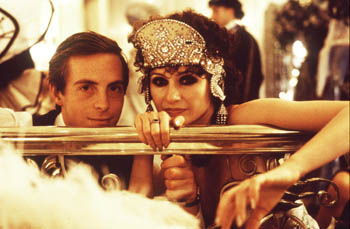![[Metroactive Movies]](/movies/gifs/movies468.gif)
[ Movies Index | Show Times | Silicon Valley | Metroactive Home | Archives ]

Party People: Stephen Campbell Moore and Emily Mortimer soak up some society style in 'Bright Young Things.' The Swank Tank All yesterday's parties: Evelyn Waugh's 'Vile Bodies' become 'Bright Young Things' in Stephen Fry's successful adaptation EVERY READER gets something different out of Evelyn Waugh's 1930 novel Vile Bodies. I wonder if some screenwriter filched the dirigible party for the grand finale of that Cecil B. De Mille cauchemar Madame Satan. (In Waugh's book, the partiers become queasy aboard the blimp. Since we're describing Waugh characters, I mean queasier than usual.) My favorite passage from Vile Bodies escaped Stephen Fry's recommended film adaptation Bright Young Things. It's a postscript regarding the party invitations sent by an upper-class twit called Johnnie Hoop: "There was the nice sensible copybook hand sort with a name and At Home and a date and time and address ... and finally there was the sort Johnnie Hoop used to adapt from [the Vorticist magazine] Blast and Marinetti's Futurist Manifesto. These had two columns of close print; in one was a list of all the things Johnnie hated, and in the other all the things he thought he liked." There's your culprit. Johnnie Hoop is the sire of all "What's Hot and What's Not" lists that have been a crutch for a century's worth of style-section scribblers. Waugh still hits his mark. In the era of Paris Hilton, there's enough blood in the upper crust to make Bright Young Things an often killingly funny movie. London between World Wars I and II: An expatriate novelist named Adam Symes (Stephen Campbell Moore) has returned from Paris, bearing his lost-generation novel, impenetrably disguised under the pen name "Sue de Nimes." British customs confiscates the manuscript as pornography. Now Symes is unemployed and in debt to the blustering publisher of the Daily Excess, Lord Monomark (Dan Aykroyd)—Waugh's caricature of Lord Beaverbrook, the Rupert Murdoch of his day. Monomark has his eye on Symes. The press baron's current gossip columnist "Mr. Chatterbox" is about to crack under the strain of all those parties. ("They say the honest newspaper-fellow who sits in the hall and takes down the names of the great ones who are admitted to the feast, dies after a little time. He can't survive the glare of fashion long."—William Thackeray, Vanity Fair) Monomark guesses Symes could be tough enough to take over the society beat. In the meantime, Adam can never seem to get the money together to marry Nina Blount (Emily Mortimer), the girl he loves. When the mantle of Chatterbox descends on Symes' shoulders, his already desperate life turns surreal. Under pressure of debt and stress, he does what many a journalist has done under deadline pressure: makes stuff up. When filming the various swanky social events—heaven and hell theme parties, for example, destined to drive anyone to misanthropy—Fry needed and lacked the precise choreographed crowd wrangling of a Max Ophuls or a Robert Altman. Instead, he just gives his camera a good spin, like a top. Still, the witty Fry proffers a trayful of tidbits by some of the best leading character actors of England. Simon Callow out-Tamiroffs Akim Tamiroff as the deposed king of Anatolia (Ruritania in the book). Jim Broadbent does the bit about the peppery old drunken major: a screw-turning device about an enormous sum of money Symes can never quite get his hands on. And Stockard Channing, under alarming white makeup, plays the American lady evangelist Mrs. Melrose Ape, who leads the hymn "There Ain't No Flies on the Lamb of God." Peter O'Toole has acted out decayed members of the British elite since The Ruling Class back in the 1970s, but his five minutes as a senile old colonel is a masterpiece of exasperating stubbornness. The colonel is dead except for his braying voice. Suddenly his opaque eyes go milky with self-pity because the Times didn't print a letter he wrote once—during the War of 1812? Also with merit are Fenella Woolgar, in the Fiona Shaw-like role of the long-jawed featherbrain Agatha Runcible, who almost brings the British government down without trying. Equally good is James McAvoy as the feverish Scots earl who writes under the name Mr. Chatterbox. In his death scene, Fry manages to capture perfectly Waugh's zone between pathos and mockery. After too-stately adaptations of Waugh such as Brideshead Revisted and A Handful of Dust, the movie is just right, properly smart and brittle. One understands Fry's weak-kneed commercial decision to wreak a happy ending. The book ended with a sex scene between a floozie and a general, ready to mate and breed a new high society: a crowd as mindlessly obedient as soldiers and as supine as whores.
Bright Young Things (R; 106 min.), directed and written by Stephen Fry, based on the novel by Evelyn Waugh, photographed by Henry Braham and starring Stephen Campbell Moore and Simon Callow, opens Friday at selected theaters.
Send a letter to the editor about this story to letters@metronews.com. [ Silicon Valley | Metroactive Home | Archives ]
|
From the September 8-14, 2004 issue of Metro, Silicon Valley's Weekly Newspaper.
Copyright © Metro Publishing Inc. Metroactive is affiliated with the Boulevards Network.
For more information about the San Jose/Silicon Valley area, visit sanjose.com.